16 nov 2016
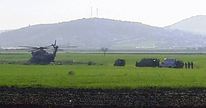
The Israeli Occupation Forces (IOF) forced Wednesday 16 Palestinian families to evict their houses in the Jordan Valley under the pretext of conducting military drills in the area.
Local activist Mutaz Basharat affirmed that Israeli Civil Administration crews stormed the area and delivered eviction orders against 16 families in Jordan Valley.
The Israeli crews gave the families 24 hours to evict their houses before the start of military drills, the sources added.
Basharat pointed out that 68 family members, mostly children, will remain homeless during the military drills.
Meanwhile, Israeli authorities issued a stop-building order against a water pool in the Jordan Valley.
Local activist Mutaz Basharat affirmed that Israeli Civil Administration crews stormed the area and delivered eviction orders against 16 families in Jordan Valley.
The Israeli crews gave the families 24 hours to evict their houses before the start of military drills, the sources added.
Basharat pointed out that 68 family members, mostly children, will remain homeless during the military drills.
Meanwhile, Israeli authorities issued a stop-building order against a water pool in the Jordan Valley.
7 nov 2016

The Israeli police forces arrested Monday afternoon two Palestinian women while leaving al-Aqsa Mosque and closed a wedding hall in occupied Jerusalem. Local sources said that the two Jerusalemite women were detained and taken to a nearby investigation center just after leaving al-Aqsa.
Meanwhile, Israeli police closed a wedding hall in Alezariye town, southeast of occupied Jerusalem, over noise pretexts.
Eyewitnesses affirmed that Israeli forces stormed the town and broke into the wedding hall before pasting a copy of the closure order on the gate under the pretext of annoying the settlers in Ma'ale Adumim settlement illegally built on the town's land.
Along the same line, Israeli forces confiscated Palestinian-owned agricultural facilities in Samu town, south of al-Khalil.
The confiscated facilities include construction materials, water tank, and a mobile house.
Meanwhile, Israeli police closed a wedding hall in Alezariye town, southeast of occupied Jerusalem, over noise pretexts.
Eyewitnesses affirmed that Israeli forces stormed the town and broke into the wedding hall before pasting a copy of the closure order on the gate under the pretext of annoying the settlers in Ma'ale Adumim settlement illegally built on the town's land.
Along the same line, Israeli forces confiscated Palestinian-owned agricultural facilities in Samu town, south of al-Khalil.
The confiscated facilities include construction materials, water tank, and a mobile house.
3 nov 2016
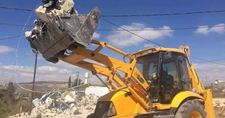
The Israeli Occupation Forces (IOF) notified Thursday a number of Palestinian agricultural facilities with demolition in Qasra town, south of Nablus.
Mayor of Qasra Abdul Adhim Wadi told the PIC reporter that Israeli authorities notified a number of local farmers to demolish their agricultural facilities, located near Migdalim settlement illegally built north of the town, within seven days under the pretext of being built in Area C.
The notified facilities include EU-funded barns and water wells, the mayor said, adding that a water tank and a fence were also demolished in the area.
Demolitions in the occupied West Bank and Jerusalem have seen an unprecedented upsurge in recent months, as Israeli authorities demolished 905 Palestinian structures in the occupied Palestinian territories so far this year, in a big increase from 453 in all of 2015, according to UN documentation.
Mayor of Qasra Abdul Adhim Wadi told the PIC reporter that Israeli authorities notified a number of local farmers to demolish their agricultural facilities, located near Migdalim settlement illegally built north of the town, within seven days under the pretext of being built in Area C.
The notified facilities include EU-funded barns and water wells, the mayor said, adding that a water tank and a fence were also demolished in the area.
Demolitions in the occupied West Bank and Jerusalem have seen an unprecedented upsurge in recent months, as Israeli authorities demolished 905 Palestinian structures in the occupied Palestinian territories so far this year, in a big increase from 453 in all of 2015, according to UN documentation.
26 oct 2016
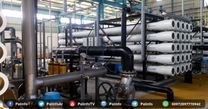
Dozens of Palestinian engineers, technicians and workers have been busy building the first seawater desalination project in Gaza, which would partially solve the deteriorating water crisis in the Gaza Strip.
The plant is about 500 meters away from the coast of Deir al-Balah, in central Gaza Strip, and spans over a total area of five acres. There are plans to make it the main water desalination plant in Gaza on an area of 80 acres.
Facing degradation of water resources
Zidan abu Zuhri, a supervisor on the project, said that the importance of this project arose as specialized studies showed that water resources in the Gaza Strip have dramatically degraded. It has become a must to look for alternative water resources to at least to keep Gaza a livable place, he added.
The United Nations has concluded in a recent report that %97 of the Gaza Strip water is unfit for drinking or domestic use.
The project provides water for almost 75,000 people in the south of Gaza in three phases.
According to Abu Zuhri, the first phase is to remove impurities and suspended solids using layers of fine sand, rough gravel and carbon through which water seeps and gets purified. Then water is pumped into another device to remove smaller impurities and suspended solids.
In the third phase, the desalinated water is provided for the people through an 18-kilometer-long pipe.
The estimated annual consumption rate of drinking and agricultural water wells in the Gaza Strip is about 200 million cubic meters (cmc). And it is estimated to reach 260 (cmc) by the year 2020.
Stages of development
The supervisors of the plant said it would be developed through three stages. The first stage, which is the current stage, produces 6000 cubic meters of purified water a day. The second stage would reach 14,000 cubic meters; and funding has been ensured for the second stage. The third stage would produce 20,000 cubic meters a day.
Abu Zuhri said, “Desalinated water is being mixed with municipal water wells to reach the international water quality standards.”
“The main obstacle that delayed the start of the project is importing the needed machinery. The Israeli occupation viewed most of the machinery as dual-use and took time to allow them into Gaza,” he added.
One month to go
Rebhy el-Sheikh, the Palestinian Water Authority's deputy chairman, stated that the first phase of the project cost 10 million euros to produce 6,000 cubic meters of desalinated water a day for 75,000 Palestinians in Rafah and Khan Younis cities.
He confirmed that the project is going to start pumping water within a month, describing it as “the largest vital and strategic project in the Gaza Strip.”
The plant is about 500 meters away from the coast of Deir al-Balah, in central Gaza Strip, and spans over a total area of five acres. There are plans to make it the main water desalination plant in Gaza on an area of 80 acres.
Facing degradation of water resources
Zidan abu Zuhri, a supervisor on the project, said that the importance of this project arose as specialized studies showed that water resources in the Gaza Strip have dramatically degraded. It has become a must to look for alternative water resources to at least to keep Gaza a livable place, he added.
The United Nations has concluded in a recent report that %97 of the Gaza Strip water is unfit for drinking or domestic use.
The project provides water for almost 75,000 people in the south of Gaza in three phases.
According to Abu Zuhri, the first phase is to remove impurities and suspended solids using layers of fine sand, rough gravel and carbon through which water seeps and gets purified. Then water is pumped into another device to remove smaller impurities and suspended solids.
In the third phase, the desalinated water is provided for the people through an 18-kilometer-long pipe.
The estimated annual consumption rate of drinking and agricultural water wells in the Gaza Strip is about 200 million cubic meters (cmc). And it is estimated to reach 260 (cmc) by the year 2020.
Stages of development
The supervisors of the plant said it would be developed through three stages. The first stage, which is the current stage, produces 6000 cubic meters of purified water a day. The second stage would reach 14,000 cubic meters; and funding has been ensured for the second stage. The third stage would produce 20,000 cubic meters a day.
Abu Zuhri said, “Desalinated water is being mixed with municipal water wells to reach the international water quality standards.”
“The main obstacle that delayed the start of the project is importing the needed machinery. The Israeli occupation viewed most of the machinery as dual-use and took time to allow them into Gaza,” he added.
One month to go
Rebhy el-Sheikh, the Palestinian Water Authority's deputy chairman, stated that the first phase of the project cost 10 million euros to produce 6,000 cubic meters of desalinated water a day for 75,000 Palestinians in Rafah and Khan Younis cities.
He confirmed that the project is going to start pumping water within a month, describing it as “the largest vital and strategic project in the Gaza Strip.”
11 oct 2016
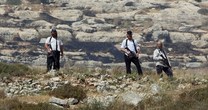
Crews of the Israeli Mekorot Company deliberately dumped waste water in Palestinian-owned land used to cultivate olive trees in Salfit, eyewitnesses told the PIC reporter.
The sources pointed out that local farmers were not able to reach their agricultural lands for picking their olive harvest.
Local activist Khaled Maali affirmed that Mekorot Company repeatedly cut off water supplies to Palestinians while increasing water flow to the neighboring illegal settlement.
Local farmers are also prevented from drilling artesian wells in area, he added. Each year during the olive harvest many settlers attack Palestinian farmers, destroy trees, and even steal olives after they have been collected, making the Palestinian farmers fear for their livelihood.
Olives not only makes up a large percentage of Palestinian income and food supply but the crop is also a part of the Palestinian identity, history, and culture.
The sources pointed out that local farmers were not able to reach their agricultural lands for picking their olive harvest.
Local activist Khaled Maali affirmed that Mekorot Company repeatedly cut off water supplies to Palestinians while increasing water flow to the neighboring illegal settlement.
Local farmers are also prevented from drilling artesian wells in area, he added. Each year during the olive harvest many settlers attack Palestinian farmers, destroy trees, and even steal olives after they have been collected, making the Palestinian farmers fear for their livelihood.
Olives not only makes up a large percentage of Palestinian income and food supply but the crop is also a part of the Palestinian identity, history, and culture.
9 oct 2016
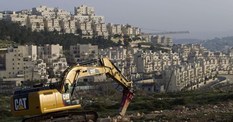
The Israeli occupation army on early Sunday morning knocked down Palestinian civilian structures in the occupied northern Jordan Valley.
Activist Mootaz Besharat, in charge of the settlement file in the Jordan Valley, said a flock of ten Israeli military patrols and four army jeeps rolled into al-Ras al-Ahmar area and imposed a tight security cordon before they carried out large-scale demolitions.
A chain of residential barracks and others for raising livestock, along with a water line used by over eight Palestinian families, were destroyed in the process.
The occupation soldiers forced the native Palestinian inhabitants out and prevented them to come close to the demolition scene. According to observers, the demolitions make part of an Israeli scheme of ethnic cleansing against the Palestinian natives of the Jordan Valley.
The Israeli occupation authorities have often come down heavily on the Palestinians living in the area, subjecting them to forced dislocation in an attempt to exploit the area’s abundant natural resources.
Activist Mootaz Besharat, in charge of the settlement file in the Jordan Valley, said a flock of ten Israeli military patrols and four army jeeps rolled into al-Ras al-Ahmar area and imposed a tight security cordon before they carried out large-scale demolitions.
A chain of residential barracks and others for raising livestock, along with a water line used by over eight Palestinian families, were destroyed in the process.
The occupation soldiers forced the native Palestinian inhabitants out and prevented them to come close to the demolition scene. According to observers, the demolitions make part of an Israeli scheme of ethnic cleansing against the Palestinian natives of the Jordan Valley.
The Israeli occupation authorities have often come down heavily on the Palestinians living in the area, subjecting them to forced dislocation in an attempt to exploit the area’s abundant natural resources.
7 oct 2016
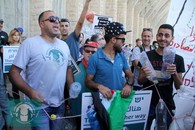
At least 200 people joined on Friday the monthly freedom March demanding the Israeli occupation to “ Stop drying out Palestine, Water is a Right for All”. The protest was organized by Combatants for Peace movement in association with a number of Palestinian and Israeli NGO’s.
The protest started at midday from Huassan village round about, south of Bethlehem city, and marched via road 60 all the way to the tunnel checkpoint separating Bethlehem area from Jerusalem.
During the march protesters carried a water tank made out of cartons, empty bottles of water and signs demanding the occupation to stop taking Palestinian water and fair distribution to all residents in the West Bank.
When arriving at the checkpoint the Theater group of CFP preformed a small play about the life of Palestinians under occupation and the difficulties they face.
At the end of the protest, Yessri Salameen, from CFP, delivered a speech saying “what the occupation is doing is a clear violation on Palestinian water” he added “From here we demand that there be justice and fairness and application of international laws and norms in the distribution of water fairly to all citizens in the occupied territories.”
From her part, Dr. Yeela Ra’anan, from Standing Together coalition, a partner group in the freedom march, she said “ As long as there is occupation there will not be peace, the inequality in the distribution of water between the two parties by the occupation has no justification because Israel has advanced water technologies that allow it to overcome the drought and better distributes water.
Combatants for Peace movement calls for the establishment of an independent Palestinian state with its capital in East Jerusalem, based on the border of June 4, 1967, alongside Israel. CFP uses nonviolent means and call on both nations to join us to achieve peace and reconciliation between Palestinians and Israelis.
The protest started at midday from Huassan village round about, south of Bethlehem city, and marched via road 60 all the way to the tunnel checkpoint separating Bethlehem area from Jerusalem.
During the march protesters carried a water tank made out of cartons, empty bottles of water and signs demanding the occupation to stop taking Palestinian water and fair distribution to all residents in the West Bank.
When arriving at the checkpoint the Theater group of CFP preformed a small play about the life of Palestinians under occupation and the difficulties they face.
At the end of the protest, Yessri Salameen, from CFP, delivered a speech saying “what the occupation is doing is a clear violation on Palestinian water” he added “From here we demand that there be justice and fairness and application of international laws and norms in the distribution of water fairly to all citizens in the occupied territories.”
From her part, Dr. Yeela Ra’anan, from Standing Together coalition, a partner group in the freedom march, she said “ As long as there is occupation there will not be peace, the inequality in the distribution of water between the two parties by the occupation has no justification because Israel has advanced water technologies that allow it to overcome the drought and better distributes water.
Combatants for Peace movement calls for the establishment of an independent Palestinian state with its capital in East Jerusalem, based on the border of June 4, 1967, alongside Israel. CFP uses nonviolent means and call on both nations to join us to achieve peace and reconciliation between Palestinians and Israelis.
6 oct 2016
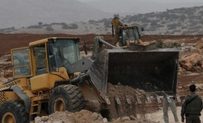
Israeli soldiers, accompanied by a number of armored bulldozers, invaded Thursday the at-Tass area, west of Kharas town, west of the southern West Bank city of Hebron, before bulldozing and uprooting 40 Dunams (9.88 Acres) of Palestinian lands.
Abdul-Fattah Qodeimat, the head of Kharas Local Council, told the Maan News Agency that the lands were planted with almond and olive trees.
He added that the soldiers also demolished several water wells in the invaded and uprooted lands, and that the wells belong to the families of Qodeimat, Halahla and Sa’id.
The official denounced the Israeli violations, and said that the soldiers are trying to force the Palestinians out of their lands, in order to build and expand the illegal Jewish-only colonies.
It is worth mentioning that, on Wednesday, the army invaded and uprooted 36 Dunams (8.89 Acres) near Kharas.
Abdul-Fattah Qodeimat, the head of Kharas Local Council, told the Maan News Agency that the lands were planted with almond and olive trees.
He added that the soldiers also demolished several water wells in the invaded and uprooted lands, and that the wells belong to the families of Qodeimat, Halahla and Sa’id.
The official denounced the Israeli violations, and said that the soldiers are trying to force the Palestinians out of their lands, in order to build and expand the illegal Jewish-only colonies.
It is worth mentioning that, on Wednesday, the army invaded and uprooted 36 Dunams (8.89 Acres) near Kharas.
